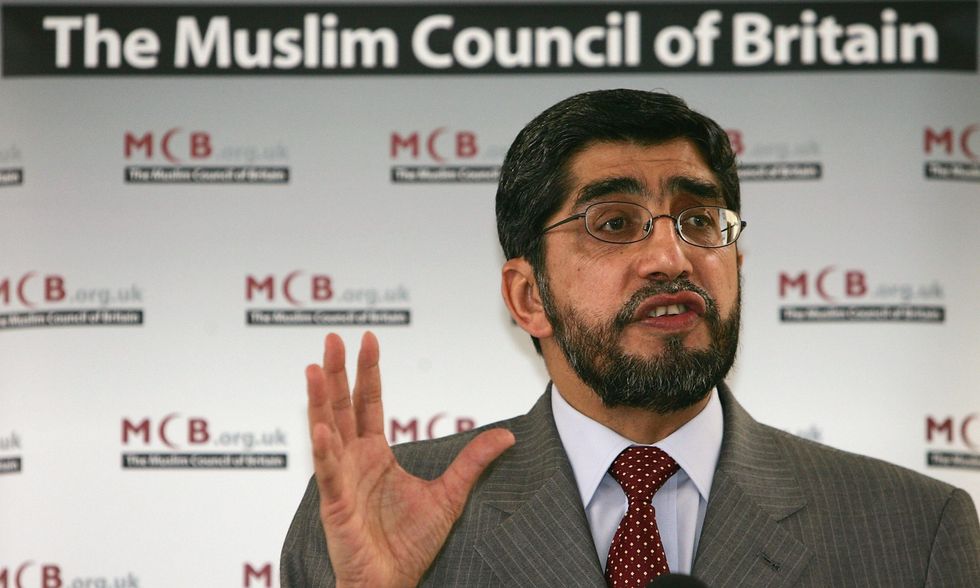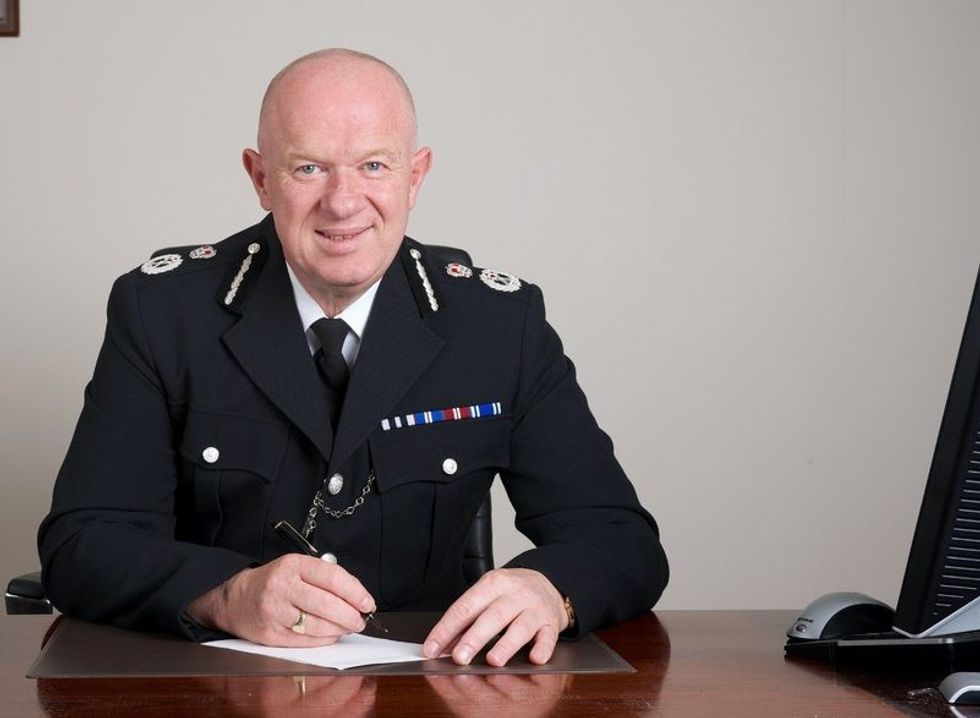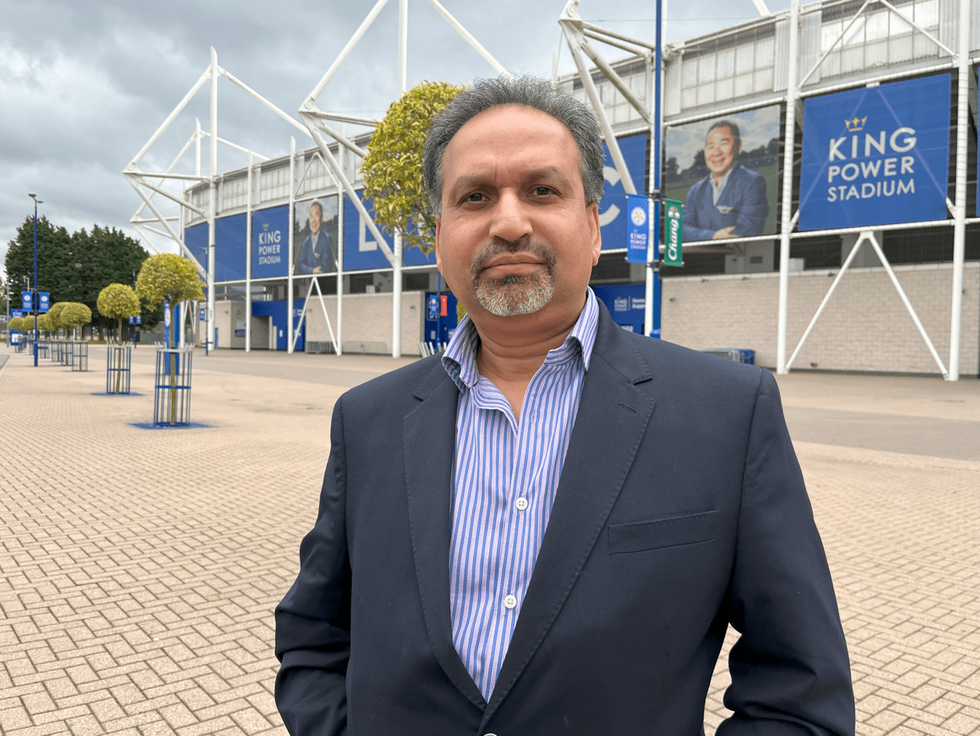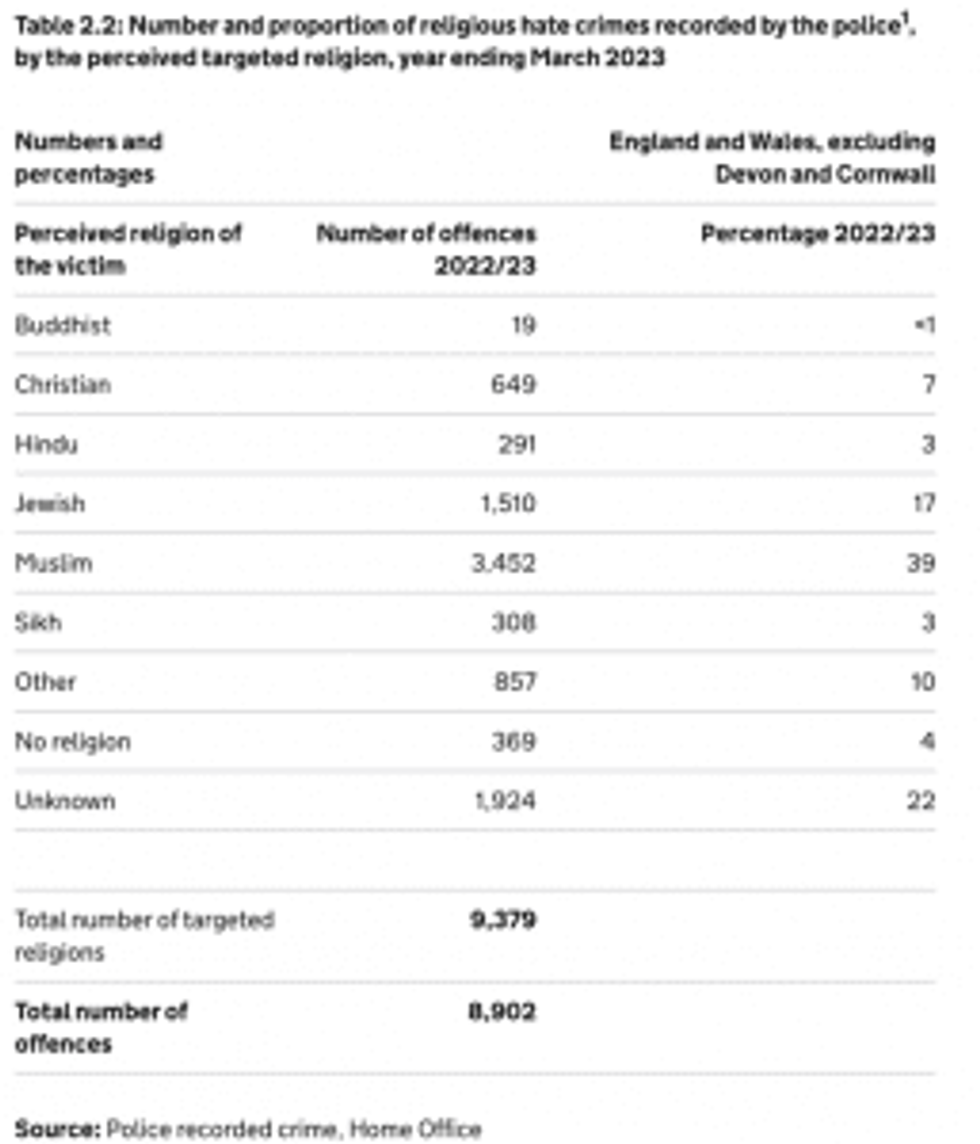MINISTERS and the media are contributing to hate crime against British Muslims, according to politicians and community leaders.
Last week (5) saw a nine per cent year-on-year increase in reported religious hate crime figures.
Politicians, religious leaders and campaigning groups are urging them to stop demonising Muslims.
Of the almost 9,400 people targeted, just over 3,450 or 39 per cent were Muslim – the highest figure for the main faith groups in England and Wales recorded by the police.
It dwarfed the offences against Sikhs, Hindus and Buddhists – 308, 291 and 19 respectively.
“The increase in Islamophobic attacks in recent years is undoubtedly caused by the rise of far right and Islamophobic rhetoric by the government,” Afzal Khan, MP for Manchester, Gorton, told Eastern Eye.
“In the week after Boris Johnson made his infamous comment about Muslim women being akin to ‘bank robbers and letterboxes’, hate crimes against Muslims surged by 375 per cent.
“More recently, we had the home secretary [Suella Braverman] falsely claim child grooming gangs in the UK were ‘almost all British-Pakistani’.
“And just last week we had the Conservative London mayoral candidate, Susan Hall, promote far-right tropes about Muslims.
“When people at the very top spread Islamophobic hate, this has real world consequences for British Muslims.”

Condemnation
Last week (3), Braverman used the Conservative Party conference to make her case to be tougher on immigration, describing illegal migration as a “hurricane”.
“One of the most powerful forces reshaping our world is unprecedented mass migration.
“The wind of change that carried my own parents across the globe in the 20th century was a mere gust compared to the hurricane that is coming.
“Because today, the option of moving from a poorer country to a richer one is not just a dream for billions of people.
“It’s an entirely realistic prospect.”
Many, including some in her party condemned her use of language which they described as echoing the infamous “rivers of blood” speech by Enoch Powell in 1968.
They also criticised her for a speech in America, where she told an audience in Washington that multiculturalism had failed.
“You can see it play out on the streets of cities all over Europe, from Malmo, to Paris, Brussels, to Leicester,” said the home secretary.
This kind of rhetoric results in anti-Islamic sentiment, said a senior imam at Makkah Mosque in Leeds, Qari Asim.
“There's a conflation of the issue with migration and Muslims,” he explained. “Sometimes the terminology with refugees and Muslim is used interchangeably.
“And the inference seems to be drawn that effectively all refugees are from Muslim background, and therefore some national issue.
“So, this, coupled with general misconception about Muslims, has resulted in the continued rise in anti-sentiment and Islamophobia.
“Demonisation does not happen in a vacuum, and demonisation isn't happening overnight.
“That is the gradual demonisation empowered by or influenced by political rhetoric and the mainstream media targeting Muslims.”

Online hatred
This misconception, said the chair of Mosques and Imams National Advisory Board, heightens the fear of and actual attacks.
Asim’s organisation has found that children as young as 12 are using racial slurs in schools.
“The consequences are that people are afraid to go out late in the night, wait in the bus stops or afraid of being attacked in supermarkets.
“Young Muslims are sometimes called terrorists and refugees.
“The young may not necessarily know the implication of what they're saying, because they're hearing it on our social media and electronic media which are then being used to target and bully children in the playground.”
The hatred was worse online, the senior imam said.
“Online hatred is rampant because people can hide behind anonymity.
“I personally experienced that with some of the things and positions I take are often subject of trolls.
“I’m not saying all the politicians are guilty of that [rhetoric], but it normalises the sentiments that some people have about minority communities and multifaith communities.”
Some Muslim leaders criticised print and broadcast media for stoking up hatred.
The media seized on Braverman’s grooming gangs’ comments, for example, they said.
The home secretary wrote in the Mail on Sunday that UK child grooming gangs were “almost all British-Pakistani men”.
She repeated her claims in broadcast interviews.
Complaints
This led to complaints from the Muslim Council of Britain’s Centre for Media Monitoring (CfMM) to the newspaper regulator, Independent Press Standards Organisation (Ipso).
The paper was forced to clarify the home secretary’s comments.
“The communities are very concerned,” Sir Iqbal Sacranie, former secretary-general of the MCB told Eastern Eye.
“The statistics, from various research organisations, really pointed out that the serious concern was the growth of the right-wing organisations.
“Now it's much more open in the mainstream media.
“Various journalists are very open in such attacks, and it's in supporting this sort of right-wing institutions.
“So, I think there is a greater need for some sort of oversight by the regulators on the articles that are coming out., because it is deeply worrying.”

He wants firmer action against those who incite hatred.
“Why is it that the government, and all political parties for that matter, have very clear policies to deal with anti-Semitism and when anti-Semitic statements are being made?
“Action is taken forthwith, and I think they should the same across all forms of phobias.
“Any such as statements that targets individual community or group of people, action should be taken immediately.
“A lesson needs to be given that this is not acceptable in a civilised society.”
The Labour MP for Manchester, Gorton, Afzal Khan, told Eastern Eye that change had to come from the top.
“We need the government to take a firm stance against Islamophobia and hate against Muslims,” he said.
“That starts with stopping the Islamophobia from within their own cabinet and party.
“We also need the government to commit to adopting the formal definition of Islamophobia, setting out what Islamophobia entails is the first step to tackling it.”
For senior imam, Qari Asim, the way to try to reverse the trend of Islamophobia and religious hatred is to communicate what unites communities rather than divides us.
“We've looked to joining hands to eliminate prejudice and bigotry and intolerance from our society, whether it be online or offline.
“It's not just an issue that just affects certain communities, it affects all of us.
“So, my plea to fellow Brits would be that whenever you hear such rhetoric, whether it be at our dinner table or electronic media or in parliament, we need to challenge this rhetoric and behaviour, from the top to the bottom.”
Analysis
You would be forgiven for thinking that hate crime had truly gone down and the prime minister’s, the home secretary’s, and the Sewell report’s assertion that racism was no longer a problem in 2023 Britain, writes Barnie Choudhury.
But nothing could be further from the truth.
Racism is alive and well and thriving.
But hang on, the government’s figures show that overall hate crime has dropped to 145,214 in the year ending March 2023 from 153,536 offences in the same period in 2022.
That’s more than a five per cent decrease.
Look at the small print.
“A NCHI is an act that is motivated by prejudice or hostility towards a person’s identity but does not amount to a criminal offence.”
In other words, we are comparing apples with pears and few, if anyone, has asked the question why the police have decided to change the way it records hate crime or what effect that might have on the data.
No matter what, of the 145,214 overall hate crime offences recorded by the police, 70 per cent were race hate crimes – just as in previous years.
No matter what Rishi Sunak, Suella Braverman or Lord Sewell says, we still have a problem with racism, and we can’t be complacent.
According to these figures, in the past 10 years, racially motivated crime has steadily dropped from 85 per cent in March 2013.

While the government will want to pat itself on the back, it should also consider that trust in policing has decreased to 50 per cent in the past two years, according to His Majesty's Chief Inspector of Constabulary Andy Cooke.
The Home Office explains the drop like this:
“This fall was largely driven by a decrease in racially or religiously aggravated public fear, alarm or distress when flagged as a hate crime, which fell by eight per cent, from 50,866 to 46,780 offences.”
I’m not sure what that means.
What sources have told Eastern Eye is that racism has become more covert, driven underground, growing like fungi and festering like a deep wound whose scab never heals.
You only find examples after the fact, usually because someone films something incendiary or someone reveals awful comments on WhatsApp messages between police officers.
We know that police recorded a nine per cent rise in religious hate crimes, from 8,602 to 9,387 offences.
But for south Asian communities these figures nail the myth that Hindus are being attacked more than other south Asian religions.
The police recorded under 300 offences or three per cent of all religious hate crime – compare that with 39 per cent or 13 times the proportion for Muslims.
The two faith groups which are consistently targeted are Muslims and Jews.
Over this weekend, social media was full of posts, which Eastern Eye has been unable to verify, of Muslims celebrating the deaths, kidnappings and rapes in Israel carried out by Hamas.
The fear now among Muslims and Jews is that there will be another spike in hate crime.
“I’m deeply concerned, and I condemn violence against civilians on all sides, and at all times,” Qari Asim, the chair of Mosques and Imams National Advisory Board, told Eastern Eye.
“All lives are precious, and I urge the international communities to do everything possible to de-escalate the current rise in violence in Palestine and Israel.

“I'm aware that the attacks in Israel and Gaza will have caused dismay, anger, fear in many people here in this country.
“But we must not let the violence in that region to destabilise the relations between our Jewish and Muslim communities in this country.
“I’m really fearful that we've already seen some of the newspapers effectively use very blunt, horrific language about Islam and Muslims.
“At the same time, I've heard there may have been an attack on a kosher shop in Golders Green in London.
“So, we already seen rhetoric and physical attacks on both communities.”
What will concern communities is that by the Home Office’s own admission, “the changing caseload and crime mix being dealt with by the police” may have caused an increase where “the proportion of cases recorded where victims did not support police action and cases where no suspect was identified”.
On average, the police are spending more time investigating violent hate crime, according to the data.
But on the downside, forces still aren’t recording the ethnicity of victims of racism and religious hate crime in almost half the cases (47 per cent) they sent to the Home Office – something they’ve been required to do since 2021.
That won’t help win the trust of communities, and academics, Home Office ministers and civil servants should be asking why full ethnic monitoring is not taking place.
The government’s definition of hate crime is this:
“Hate crime is defined as ‘any criminal offence which is perceived, by the victim or any other person, to be motivated by hostility or prejudice towards someone based on a personal characteristic.’”
The problem is that the police may not be recording it this way.


















 Damian Talbot
Damian Talbot
 Nirmala Sitharaman speaks at the India-UK Investor Roundtable in London last Wednesday (9). On the panel were India’s department of economic affairs secretary Ajay Seth and Kotak Mahindra Bank founder Uday Kotak
Nirmala Sitharaman speaks at the India-UK Investor Roundtable in London last Wednesday (9). On the panel were India’s department of economic affairs secretary Ajay Seth and Kotak Mahindra Bank founder Uday Kotak Sitharaman with Sir Keir Starmer and Rachel Reeves
Sitharaman with Sir Keir Starmer and Rachel Reeves Sitharaman with Jonathan Reynolds
Sitharaman with Jonathan Reynolds  Sitharaman with Reynolds, Alastair King, India’s high commissioner Vikram Doraiswami and other delegates
Sitharaman with Reynolds, Alastair King, India’s high commissioner Vikram Doraiswami and other delegates
